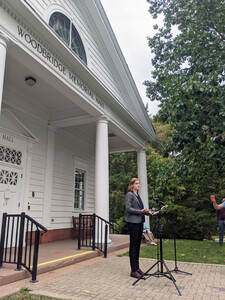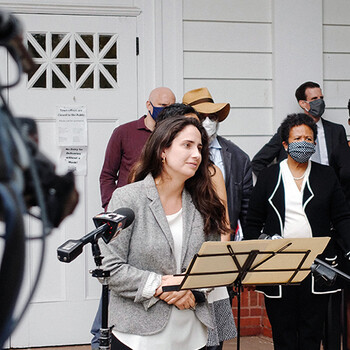Clinic Students Help Civil Rights Advocates Demand Zoning Changes to Support Fair Housing

Open Communities Alliance and the Jerome N. Frank Legal Services Organization at Yale Law School have submitted an application to the Woodbridge Plan and Zoning Commission calling for necessary changes to the town’s discriminatory zoning policies. As part of a long-term #OpenWoodbridge campaign, the proposed changes would take initial steps to bring the town's zoning into compliance with state and federal law, require the town to host its fair share of affordable housing for the region, and address decades of exclusionary zoning.
The application includes a detailed analysis4 of how the town’s zoning has illegally excluded low and moderate-income families for decades.

This effort offers Woodbridge the opportunity to bring its policies into compliance while ending decades of housing segregation, according to the groups involved in the applications. To hold the town to account, Open Communities Trust, LLC has acquired property in Woodbridge and is seeking to build a small multi-family development with a mix of market-rate and affordable rental units, a development model that is currently prohibited throughout the town. State law requires Woodbridge's zoning commission to respond to the proposed zoning amendment with a public hearing.
At present, Woodbridge’s zoning policy reserves the vast majority of its land area exclusively for single-family homes on large lots and bans the development of multi-family housing across the entire town.
WATCH: Open Communities Alliance calls for changes to zoning polices in Woodbridge, CT5
“For generations, Woodbridge’s exclusionary zoning policies have strategically made it nearly impossible for middle and low-income families to live within its borders and benefit from its resources,” said Erin Boggs, Executive Director of the Open Communities Alliance. “These policies are reminiscent of redlining practices and have functionally insulated its residents from the diversity of surrounding towns. As a first step toward remedying its legacy of segregation, Woodbridge must take immediate action to reform its zoning laws.”
Karen Anderson ’21 spent hours at Woodbridge Town Hall learning and documenting the town’s planning and zoning history. She said, “I can’t see into their hearts, but the pattern that emerges from the history seems undeniable. Over and over, when presented with proposals to make the town a little bit more inclusive, there’s this contingent of Woodbridge residents that creates a backlash and town officials give into it.”
As outlined in the application, Woodbridge’s multi-family ban creates a racially discriminatory impact that violates the federal and state Fair Housing Acts; perpetuates segregation in violation of the Connecticut Constitution; and falls far short of the Connecticut Zoning Enabling Act’s requirements to “encourage opportunities for multifamily dwellings," "promote housing for both low and moderate-income households,” and to do so “for all residents of the municipality and the planning region.”
Exclusionary zoning policies were adopted decades ago to forge racially isolated communities, build restricted enclaves, and to horde opportunities and benefits that were, in many cases, supported by taxpayer dollars,” said Lisa Rice, Executive Director of the National Fair Housing Alliance. "Many jurisdictions that have exclusive zoning ordinances benefit themselves from resources provided by the wider community. Today, when the nation faces a dire affordable housing crisis that denies hard-working families a fair shot to live in communities of their choice, we must find ways to expand equal and fair housing opportunities.”

The impact of Woodbridge's exclusionary zoning ripples out to the educational outcomes experienced by students enrolled in the Amity Regional School District and directly contributes to the opportunity gap, according to the clinic. Woodbridge students experience extreme racial isolation, denying them the well-documented cognitive, cultural, and professional benefits of a diverse learning environment. Statewide, 25.8 percent of public-school students are Hispanic and 12.8 percent are Black — but, in the Amity Regional School District, only 1.3 percent of students are Hispanic and 3 percent are Black, according to the groups’ research.
“The lack of diversity in the Amity School District and many other suburban school districts can be attributed almost entirely to the zoning controls that local governments use to exclude outsiders,” said Connie Royster, co-chair of the Open Communities Alliance Board of Directors. “Since school districts draw their student population from within their geographic boundaries, they reflect the demographics of the communities that lie within them. The simple fact is that the only way the Amity School District can realistically become a more diverse place is if towns like Woodbridge allow the construction of affordable housing. Woodbridge has a responsibility to its kids to provide the best education possible, and that means it needs to become a community that is welcoming to all.”
“Woodbridge’s zoning isn’t just discriminatory, it’s also counterproductive,” said Richard Freedman, trustee of the Garden Homes Fund, a charitable foundation helping OCA to build multi-family housing in Woodbridge. “By so tightly restricting its housing stock to single-family homes, the town has cut itself off from the next generation of Connecticut residents.”
With its large, single-family lots, Woodbridge pioneered the exclusionary zoning tactics in the 1930s that have helped make Connecticut one of the most segregated states in the country, according to those involved in the application. Even as state and federal law has evolved, Woodbridge has repeatedly refused to expand housing opportunities for Black and Hispanic families who have disproportionately greater need for affordable, multi-family units, according to those submitting the application. Not only has Woodbridge failed to meet the amended Zoning Enabling Act’s requirement for mixed housing, the town has also increased its minimum lot size for single-family homes, raising the barrier of entry for mixed housing,” said Hannah Abelow ’21. “Year after year, town officials have kept unlawful zoning restrictions in place.”
The requested zoning amendment would limit multi-family dwellings to be no larger than what current zoning permits for single-family houses in the same district, and conform to the same health and safety standards, according to the clinic. Developers are required to choose one of several affordability options that the application outlines.
Members of the Open Communities Alliance and the Jerome N. Frank Legal Services Organization said that as a result of Woodbridge’s exclusionary policies, the town is far wealthier and whiter than the surrounding region, while the immense need for affordable housing in South Central Connecticut remains unmet. The #OpenWoodbridge campaign is committed to correcting that and is eager to work with the town in doing so.
Open Communities Alliance is a Connecticut-based civil rights organization that promotes access to opportunity for all people through education, organizing, advocacy, research, and partnerships. The Alliance works to address Connecticut’s deep level of segregation and support policies that lead to housing choice.
The Jerome N. Frank Legal Services Organization at Yale Law School is a legal clinic in which students, supervised by law school faculty and participating attorneys, provide legal representation to a range of clients, including organizations seeking to promote fair housing and community and economic development. Both the Community and Economic Development Clinic, taught by Clinical Associate Professor Anika Singh Lemar, and the Housing Clinic, taught by Nathan Baker Clinical Professor of Law J.L. Pottenger ’75 represent Open Communities Alliance.


